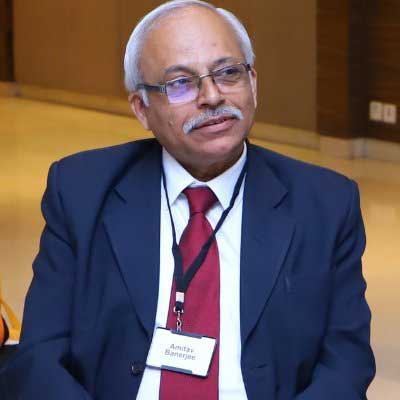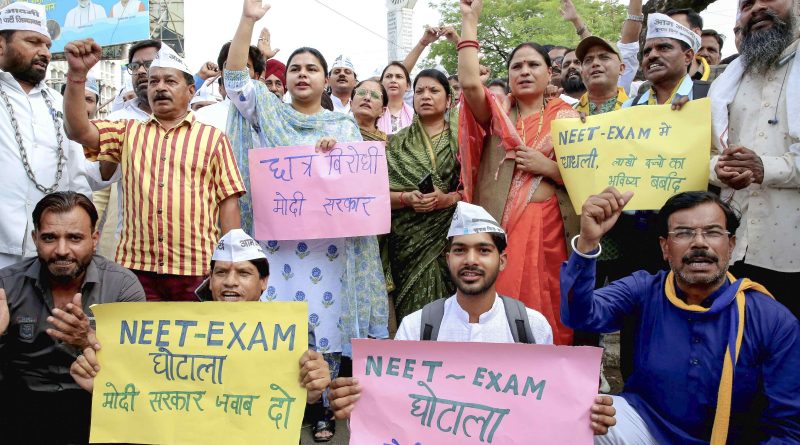A Crisis of Credibility
 The NEET-UG 2024 results have exposed severe flaws and corruption in India’s medical entrance exam system. Allegations of blatant score manipulation, widespread paper leaks, and dubious grace marks have triggered intense legal battles and public outrage. The situation draws unsettling parallels to the notorious Vyapam scam, underscoring deep-rooted systemic issues that threaten to plague the path of aspiring medical professionals.
The NEET-UG 2024 results have exposed severe flaws and corruption in India’s medical entrance exam system. Allegations of blatant score manipulation, widespread paper leaks, and dubious grace marks have triggered intense legal battles and public outrage. The situation draws unsettling parallels to the notorious Vyapam scam, underscoring deep-rooted systemic issues that threaten to plague the path of aspiring medical professionals.
By Dr Amitav Banerjee, MD
Medicine continues to be the first career choice for many aspiring youths in India, but there is a significant mismatch between demand and supply. This imbalance is exploited at all levels, resulting in a proliferation of coaching classes and strenuous, nerve-wracking preparation for entrance examinations. Kota has become the epitome of the coaching culture for these aspiring youth. Tragically, it has also been hitting the headlines for frequent suicides of young people cracking under pressure.
Turtles All the Way Down
Scams surrounding admission to medical colleges have been brewing for a long time. The latest is the ongoing controversy following the declaration of the National Eligibility Entrance Test-Undergraduate (NEET-UG) results for medical undergraduate admission on 04 June 2024.
Several unusual patterns suggest that all is not fair. The bizarre features that raise concerns include:
- Unprecedented Scores: A total of 67 candidates scored 720/720 this year, a “black swan event.” There were only two toppers who scored 720 last year, and in 2022, there were four.
- Concentration of Toppers: Six of the toppers were from a single examination centre in Haryana, with roll numbers close to each other.
- Credibility of Scores: Some candidates scored 718 and 719, which does not make sense as such scores are technically impossible. Four marks are awarded for each correct answer, while one mark is deducted for a wrong answer. So, if a student gets one answer wrong, the score will be 715; if they leave one question unanswered, the score will be 716.
- Questionable Explanation: When the National Testing Authority (NTA) was questioned about these scores, they explained that “grace marks” were awarded to candidates in some examination centres due to delays in starting the exams.
- Early Declaration: The NEET-UG results were declared on 04 June 2024, ten days earlier than the scheduled date of 14 June 2024. Some speculate this was done deliberately to suppress any protests, which would be overshadowed by the election results coming out on the same day.
Controversies, Speculations, and Court Interventions
The results have sparked speculations and controversies, triggering legal challenges and court interventions. For instance, the Kolkata High Court has directed the NTA to respond to allegations of irregularities in the NEET-UG 2024. A bench comprising Apurba Sinha Ray and Kaushik Chanda is examining a public interest litigation (PIL) challenging the award of 718 and 719 marks to certain candidates. The NTA has been directed to respond, explaining these discrepancies and how reservation policies were followed while preparing the merit list.
The Delhi High Court has also intervened. It is examining the NTA’s decision to grant grace marks. Justice Dinesh Kumar Sharma has given the NTA time to respond with fresh dates for future hearings. Another related petition challenging the final answer key to a physics question and the compensatory time given to some candidates will be heard later.
A group of aggrieved candidates has approached the Supreme Court, demanding the annulment of the NEET-UG results and the holding of fresh examinations due to alleged paper leaks and integrity concerns. The hearing is fixed for July 8, 2024.
The NEET-UG 2024 results have erupted in controversy, with allegations of manipulated scores, paper leaks, and unjust grace marks. Legal battles are intensifying, and the credibility of India’s medical entrance system hangs in the balance.
Clarifications by the NTA
To clear the mess, the NTA has given the following statements:
- Normalisation Formula: The NTA explained that grace marks were awarded to compensate for lost time during disruptions at some examination centres based on a normalisation formula approved by the Supreme Court. However, it did not mention that the Supreme Court gave this ruling for another exam and did not specifically approve it for the fiercely competitive medical entrance examination.
- Increased Number of High Scorers: The rise in scores was attributed by the NTA to a 15% increase in the number of candidates and adjustments in the answer key to account for multiple correct answers. This is a rather weak explanation considering the jump from 2 to 67 top scorers in a year.
- Transparency Measures: The NTA stated that transparency was maintained throughout the examination process and denied any paper leaks. However, they acknowledged instances of impersonation and assured that appropriate legal actions were being taken.
Further Legal Proceedings
As the legal proceedings continue, the discordant notes are jarring and raise concerns about the credibility of the NEET-UG examination process. There are many loose ends, including the arrest of 13 individuals for a paper leak in Patna, with the matter escalating to the Patna High Court. A PIL has been filed by lawyer Vishal Saurav on behalf of advocate Sujit Kumar Sinha, demanding the cancellation of the examination and an in-depth investigation by the CBI. The plea states that the future of millions of students is at stake due to the leak.
Vyapam Scam: A Precursor to Current Issues
The Vyapam Scam was the first signal that the youth and their ambitious parents are being taken for a ride. The acronym Vyapam stands for Vyavsayik Pariksha Mandal, or the Madhya Pradesh Professional Examination Board (MPPEB). The Vyapam scam was a fraud that hit the headlines over a decade ago, dealing a big blow to the credibility of entrance examinations to professional colleges. The main highlights of the scandal are:
- Discovery of Irregularities: The Vyapam scam hit the headlines in 2013 when irregularities were discovered in the Pre-Medical Test (PMT) conducted by Vyapam.
- Long-term Fraud: It later came to light that the scam had been ongoing for several years.
- Wide Involvement: The scam involved numerous middlemen, candidates, and officials who colluded to manipulate exam results, facilitate impersonation, and secure admission to government medical colleges by unfair means.
- High-Profile Arrests: The investigation into the scam led to the arrest of many high-profile individuals, including politicians, government officials, and education professionals. A few political leaders and bureaucrats were also named as accused in the case.
- Vast Extent: Thousands of candidates were part of the irregularities.
- Mysterious Deaths: The Vyapam scam gained notoriety for several mysterious deaths among the accused, witnesses, and whistleblowers. The circumstances surrounding these deaths raised concerns and controversies.
- Investigations: The scam was investigated by several agencies, including the CBI and a special task force (STF), leading to numerous arrests, chargesheets, and court cases.
- Convictions and Acquittals: Many individuals were convicted for their part in the scam, while others were acquitted due to a lack of evidence. The large number of mysterious deaths among witnesses and whistleblowers might have silenced many from coming forth to testify, raising genuine concerns that many key players were acquitted.
Parallels to the infamous Vyapam scam are hard to ignore as the NEET-UG 2024 results reveal deep-rooted corruption. Arrests, mysterious scores, and hurried announcements highlight the urgent need for an overhaul of the medical admission process.
Implications for the Country and the Medical Profession
These two irregularities in medical entrance tests, separated by more than a decade, suggest that we have not learned the lessons and fixed the problem after the first scam. What is more worrying is that this may be just the tip of the iceberg, and the medical admission mafia may have spread across the country with the involvement of many powerful players. This has several serious implications:
- Erosion of Trust: People will lose trust in the medical profession. Even without such scams, the trust of the public in the medical profession is at an all-time low. The corporatisation of the profession, converting it into big business from a noble calling, has significantly contributed to this erosion of trust.
- Unqualified Professionals: It is possible that many unscrupulous candidates who used unfair means to gain admission to medical colleges are now practicing doctors. Like the River Ganga, the noble profession of medicine is likely heavily polluted today.
- Disillusionment of Honest Aspirants: Honest youths who belong to families with high moral values and their parents face a bleak scenario, leading to despair and disillusionment. Young people may lose hope and choose other professions—unfortunately, these are the individuals who would have made good doctors and upheld the Hippocratic Oath.
(The author is a renowned epidemiologist and a professor at D Y Patil Medical College, Pune.)

